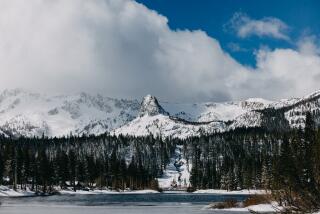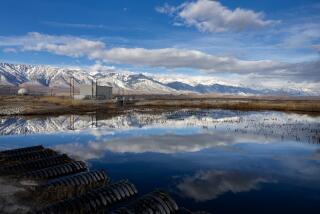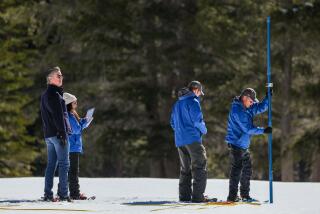California Journal: Barren a year ago, a snowpack station comes up deep and dense
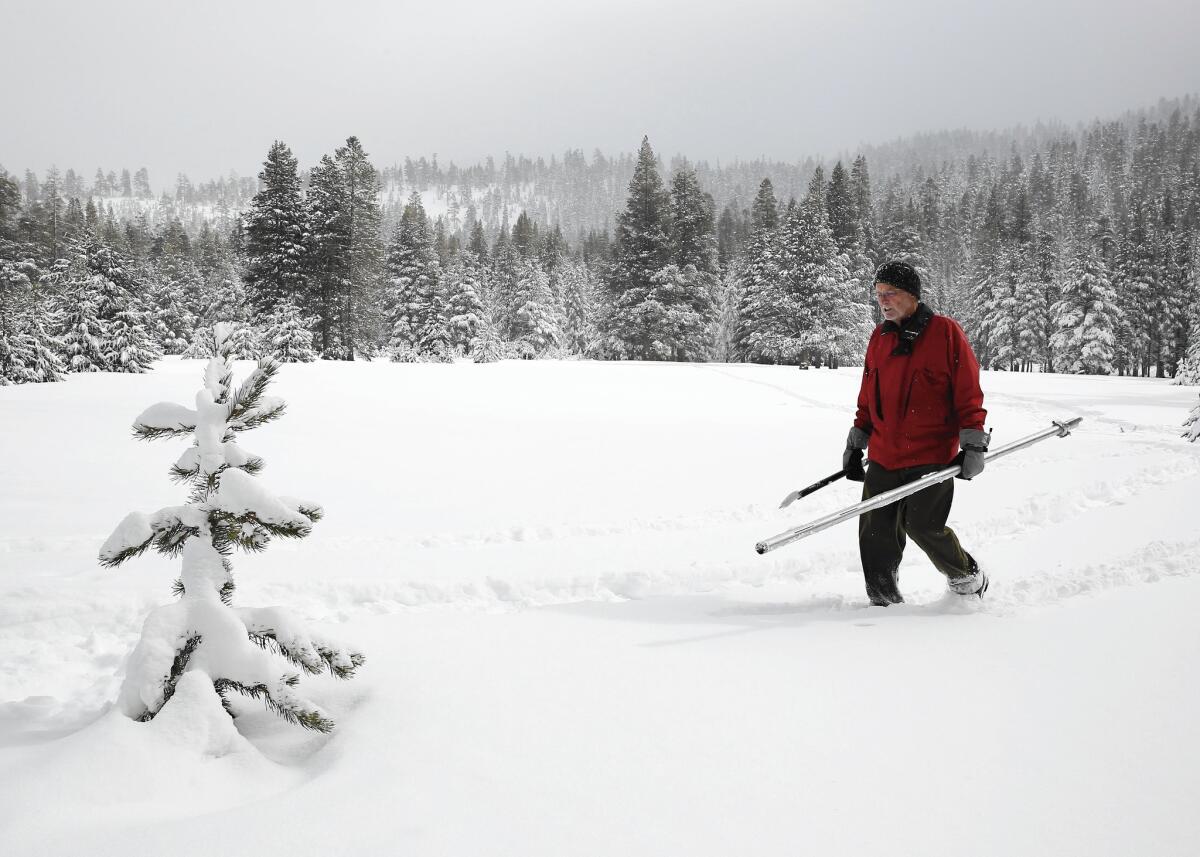
Reporting from Phillips Station, Calif. â It was 22 degrees and snowing Tuesday morning. State snow surveyor Frank Gehrke slowly crossed a blanketed field.
He periodically jabbed a hollow pole into the snow and then hung it from a portable scale, reading nature to draw a bead on where, exactly, the California drought is heading.
Gehrke, who works for the California Department of Water Resources, is the chief of a multi-agency group that surveys the stateâs snowpack. He figures out whether Californiaâs âfrozen reservoirâ is abundant enough to replenish our thirsty reservoirs when the snow melts in the spring.
See the most-read stories this hour >>
Some have called him âthe don of Sierra snow metrics.â But I think of him as the Sierra Nevadaâs Punxsutawney Phil, the famous groundhog whose shadow heralds six more weeks of winter.
If Gehrke pulls up snow that is deep, dense and wet, itâs good news for drought-plagued California, which has had anemic snowfalls since 2011.
If the snow is shallow and fluffy, itâs bad news.
If itâs nonexistent, as it was last April when Gehrke stood on dry ground and watched as Gov. Jerry Brown ordered a 25% reduction in water use, then weâre all going to die of thirst.
Or, worse, never ski again.
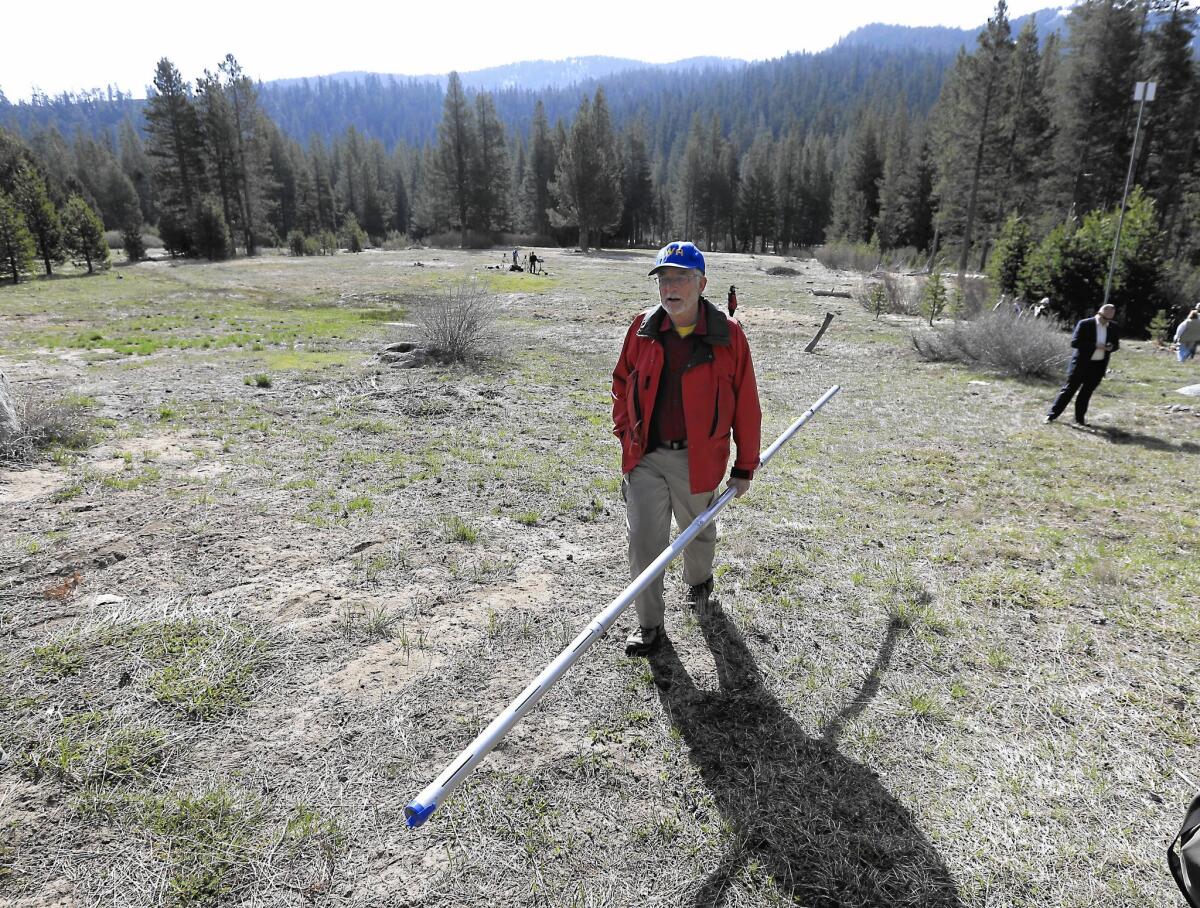
For weeks, Iâd been planning to witness the monthly snowpack reading here near the Sierra-at-Tahoe ski resort in El Dorado County. Yet, because of a fashion mishap, I almost didnât make it into the field. I had been so tense driving up snowy Highway 50 toward South Lake Tahoe â Where the heck will I get tire chains for my rental car? How the heck am I going to get the chains on? â that it didnât even occur to me to think about proper footwear.
Once I arrived at Phillips Station and parked, I could see Gehrke and two colleagues off in the distance, piercing the snow, weighing it and recording their observations. What were they telling the two dozen journalists who stood near them, chronicling the action? If I didnât traipse over there, I would miss the whole snow show.
So I plunged in. My boots sank. And sank some more. I lost my balance. I felt breathless. But mostly embarrassed. My pen froze and stopped working. My iPhone, which I use for photos, went dead in the cold.
Then, I heard Leonardo DiCaprioâs voice in my head: âAs long as you can still grab a breath, you fight.â
OK, so this wasnât exactly âThe Revenant,â in which frozen Leo climbed inside a dead horse for warmth. Yet, inspired by the scene, I stuck my iPhone inside my shirt and the tip of my pen in my mouth. The warmth revived them. Thank you, Mr. DiCaprio. I hope you win the Oscar this year.
I persevered, awkwardly. When I finally made it to Gehrke, I noticed everyone had snowshoes strapped to their boots â short, fat, ski thingies â and were gliding effortlessly across the field. Guess I missed the memo on that.
::
In the age of satellites and computer telemetry, what Gehrke was doing seemed oddly old-fashioned. Indeed, he told us, the method has not changed since the early 20th century.
That is when the Mt. Rose Snow Sampler was devised by James E. Church, a professor of classics at the University of Nevada, Reno, who also happened to be an avid outdoorsman. Seeking a solution to a conflict between loggers, who claimed clear-cutting helped increase the water content of the snowpack, which replenishes Lake Tahoe, and those who bridled at the devastation of Tahoeâs magnificent pine forests, he came up with the sampler in 1906.
Churchâs great contribution: A small-diameter pipe with a jagged end â easy to carry, easy to plunge into the snowpack â could replace a very large one. The pipes are either clear or pocked with small holes so surveyors can determine depth; the snow-filled pole is weighed to determine the water content.
Water, not depth, is the important snow metric. It was the only way to predict the amount of snowmelt that would flow into Lake Tahoe in warmer months. (The loggers were wrong.)
Many Southern Californians may not realize this, but even torrential rain in the lower half of the state does little to end the drought. Runoff flows to the ocean, uncaptured. Your lawn may brighten up (if you still have one), or you might be inconvenienced by mudslides and flooding. But youâll have no business taking leisurely showers.
Our snowpack, which supplies a third of the stateâs water, is what matters. Tuesday, we learned, things are looking up.
See more of our top stories on Facebook >>
At Phillips Station, barren less than a year ago, Gehrke measured more than 76 inches of snow, with 24.5 inches of water content â 130% of the February average since 1966.
âItâs premature to call the end of the drought,â Gehrke said. âBut itâs a very good start.â
::
By this time, an hour had passed. It was noon and the temperature was still 22. I tipped my head back and opened my mouth to catch some snow.
I had lost the feeling in my toes. My hands were so frigid I could not use my pen, which had frozen again anyway. I trudged back toward Highway 50, stepping gingerly. Just before I reached the road, I fell up to my thigh into a snow hole.
I left the mountains and drove toward the Bay Area. When I arrived, it was a balmy 55. I checked into a hotel, fired up my laptop. And began pricing snowshoes.
Twitter: @AbcarianLAT
MORE LOCAL NEWS
Time expires on claims for winning $63-million Lotto jackpot
Lopez: How a Lincoln High teacher gets all his students to pass the AP Calculus exam
Doctor faces sentencing for murder in landmark L.A. case tied to patientsâ overdose deaths
More to Read
Sign up for Essential California
The most important California stories and recommendations in your inbox every morning.
You may occasionally receive promotional content from the Los Angeles Times.
